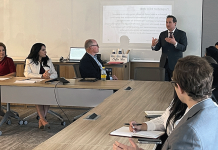 Governor Gavin Newsom yesterday signed an executive order to study the development, use, and risks of artificial intelligence (AI) technology throughout California, and to develop a deliberate and responsible process for evaluating and deploying AI within state government.
Governor Gavin Newsom yesterday signed an executive order to study the development, use, and risks of artificial intelligence (AI) technology throughout California, and to develop a deliberate and responsible process for evaluating and deploying AI within state government.
The California Chamber of Commerce welcomed the Governor’s directives, as generative artificial intelligence (GenAI) technology has wide-ranging potential for Californians and the state economy.
“We appreciate that Governor Newsom recognizes that California is a global technology and innovation leader. AI presents historic opportunities, and this executive order should help to nurture that,” the CalChamber said.
AI Technology in California
For decades, California has been a global leader in education, innovation, research, development, talent, entrepreneurship, and new technologies. As these technologies continue to grow and develop, California has established itself as the world leader in GenAI innovation with 35 of the world’s top 50 AI companies and a quarter of all AI patents, conference papers, and companies globally.
California is also home to world-leading GenAI research institutions—the University of California, Berkeley College of Computing, Data Science, and Society and Stanford University Institute for Human-Centered Artificial Intelligence—providing a unique opportunity for academic research and government collaboration.
Executive Order Directives
Under the executive order, within the next 60 days, the Government Operations Agency (GovOps), California Department of Technology (CDT), Office of Data and Innovation, and Governor’s Office of Business and Economic Development (GO-Biz) are to work in collaboration with other state entities to draft a report examining the most significant, potentially beneficial use cases for deployment of GenAI tools by the state, as well as the potential risks to individuals, communities, and government and state government workers with a focus on high-risk use cases.
By no later than March 2024, the California Cybersecurity Integration Center (Cal-CSIC) and the California State Threat Assessment Center (STAC) are to perform a joint risk analysis of potential threats to and vulnerabilities of California’s critical energy infrastructure by the use of GenAI and, upon completion, provide a classified briefing to the Governor and, where appropriate and without divulging classified information, make public recommendations for further administrative actions and/or collaboration with the Legislature to guard against these potential threats and vulnerabilities.
By January 2024, the order calls on GovOps, Department of General Services (DGS), CDT and Cal-CSIC to issue general guidelines for public sector procurement uses, and required trainings for the use of GenAI, including for high-risk scenarios, such as for consequential decisions affecting access to essential goods and services, building on the guidance from the White House’s Blueprint for AI Bill of Rights and the National Institute for Science & Technology AI Risk Management Framework, and addressing safety, algorithmic discrimination, data privacy and notice of when materials are generated by GenAI.
Relatedly, GO-Biz and GovOps are directed to pursue a formal partnership with the UC Berkeley College of Computing, Data Science, and Society and Stanford University Institute for Human-Centered Artificial Intelligence to consider and evaluate the impacts of GenAI on California and what efforts the state should undertake to advance its leadership in this industry.
As part of this, starting later this year, the agencies are directed to work with these partners to host a joint California-specific summit in 2024, to engage in meaningful discussions and thought partnership about the impacts of GenAI on California and its workforce, and how all stakeholders can support growth in a manner that safeguards Californians.


